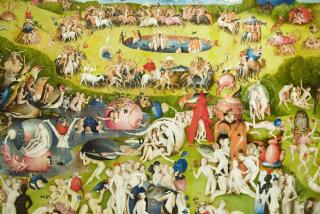GUS AND CALL, Before ‘Lonesome Dove’ : DEAD MAN’S WALK,<i> By Larry McMurtry (Simon & Schuster: $26; 477 pp.)</i>
There is a fine texture to “Dead Man’s Walk”--more than a texture, an ambience. It is a feeling one gets looking at some old ruined homestead in the desert--the quiet, relentless space--the gray weathered wood or rusted metal. One yearns to know who lived here, amazed that anyone lived here at all. The passage of time reduces everything to memory, making the need to feel what the distant inhabitants felt all the more urgent. One does not imagine a mundane life being lived out, because the erosion of the elements demands that the life be vital, dramatic, vastly important and forgotten. If it wasn’t all of these things, then what of our own lives? This book lets those old timbers creak, and the story they tell fulfills all our expectations.
The three McMurtry novels dealing with Woodrow Call and Augustus McRae are probably as close as you’re ever going to get to the way the American frontier really felt. They are, in this writer’s opinion, the finest fictional work ever done on the subject. “Lonesome Dove,” the centerpiece, is still probably the best, being that it is the foundation and the story of Call and Gus in their prime. “Streets of Laredo” is dark, as age is dark--it is the effect of the wind, rain, the ambivalence of nature. Now, with “Dead Man’s Walk,” we have the fire of youth. The book is raw in the true sense. Everything, save the wonderful McMurtry style, is about rawness. It fulfills the essential requirement of anything lasting about the frontier myth: It is about promise. The West was untrammeled, dangerous, desolate, cruel--in short, open to possibility.
In this tale, our two protagonists are 19 years old and going through their own frontier period. Texas is as untamed as Africa. It is serenely majestic, peaceful in its vastness--and nothing here dies in bed. Violence is part of the color of the landscape. Animals, nature and men are not constrained by rules or civility of any kind. Almost no one knows where they’re going or why. Everyone is driven by elemental desires--thirst, starvation, lust, greed or foolish romance. Similar impulses push men to rape a town or court a girl. Everyone blunders ahead with instinctive, naked energy. No one is very good at it. No one except the Indians. They are good at whatever they do, complete masters of their realm, unspeakably cruel and hostile. They are perfectly suited to their world. These are not the politically correct innocents we have been given of late. These are human tigers who live just past the fence post and will come into the house on a full moon.
The central one is Buffalo Hump, a Comanche war chief who plagues Call and Gus like a recurring dream. McMurtry writes about Buffalo Hump and his Apache counterpart, Gomez, with such potency that it is impossible not to feel a dark need to be like them. This deft primacy is what informs all life out here, for without it life doesn’t last long. And yet there is a strange Darwinian logic to it all. It is as it should be, not perverted by wishes, fantasies or lies. There is a memorable passage in which Kicking Wolf, a great Comanche horse thief, is torturing a white man to death. He wants to take his time, so that he can enjoy the transfer of power and the serenity it gives him. He will miss the raid if he does--it’s irresponsible, but we understand.
The plot, like “Lonesome Dove’s,” is a journey, eventually to the Jornada Del Muerte (Dead Man’s Walk, a 200-mile stretch of desolate New Mexico). The book starts out with the boys newly signed on as Texas Rangers. They know little about rangering or anything except drinking, whoring and doing what 19-year-olds should do. They are not trained or even briefed, and are led by a fraudulent major to find a road to El Paso. Why do they go? They need the money. Things don’t work out real well for some of them, including the major. There are scalpings, mutilations, death while heeding the call of nature and death by disease. The Rangers are in over their heads. The boys escape with their lives, and have learned little.
Now the real journey begins: An ill-fated Texan attempt by an ex-pirate and bald opportunist to take the city of Santa Fe from the Spanish, as well as its gold, silver and women. Any 19-year-old worth his salt would sign up for that one. On the way, Gus meets Clara, the passion of his life, and falls headlong in love. He hesitates for a second about going “out there,” but realizes that his friend Call will go and possibly come back, and then where would he be? This is wonderful McMurtry and sound reasoning, bigger then life but true. The great strength of McMurtry’s writing is always the unkempt edges and textures, the splinters worn off human wood. People are not always smart, moral, good or even bad. They make enormous mistakes and miss the obvious--and even when they do it right, they can be swept away in a prairie fire or executed by a Mexican firing squad because they picked the wrong colored bean.
Needless to say, the great expedition is full of adversity, ill fortune and disaster--not the Texans’ finest hour. But in this odyssey of survival, there are truths revealed and lessons learned. It is here that the book becomes mesmerizing: the endless flight from peril on an endless staked plain with gently undulating grasses blown by soft winds like the sea. There are bears here who kill horses with a gesture of a paw and drive men into nightmares; and Apaches who eat wolves to take their cunning, who murder for sport but are never seen. The boys don’t become wise, hardened men, but they are shaped and become attached to the great wild land that will someday claim them. Even the bare seeds of the Indian’s singular weakness are revealed, and in a struggle like this, one weakness is enough.
Throughout all this are the McMurtry women. They are eternal figures, as distinctly apart from men as the grass, in their own way just as strong and driven, and certainly a bit more clever. Mattie Roberts, the 200-pound whore accompanying the expedition, becomes one of the tale’s most enduring presences--almost a mystical symbol, a fertility goddess. And then there is Lady Carey, the once beautiful English noblewoman, who more truly understands the harsh beauty of this reality than any of the men. She becomes a character of immense mystical power, the most unforgettable woman McMurtry has created.
What amazes continually in this book is McMurtry’s understanding of time and the land--how distant we are from it, how we protect ourselves from its truth and, ultimately, how strong and exciting that truth really is. In “Dead Man’s Walk,” McMurtry uses a simple, wry storyteller’s voice, immensely accessible, and with it he ponders the same questions that Melville and Conrad did. This is a great book. I like it better than “Lonesome Dove,” which to me has taken on religious significance. Larry McMurtry, at his best here, is one of the finest American novelists, ever. We are lucky he’s around.
“Dead Man’s Walk” is also available (unabridged) read by Will Paton on 14 audiocassettes ($50).
More to Read
Sign up for our Book Club newsletter
Get the latest news, events and more from the Los Angeles Times Book Club, and help us get L.A. reading and talking.
You may occasionally receive promotional content from the Los Angeles Times.





